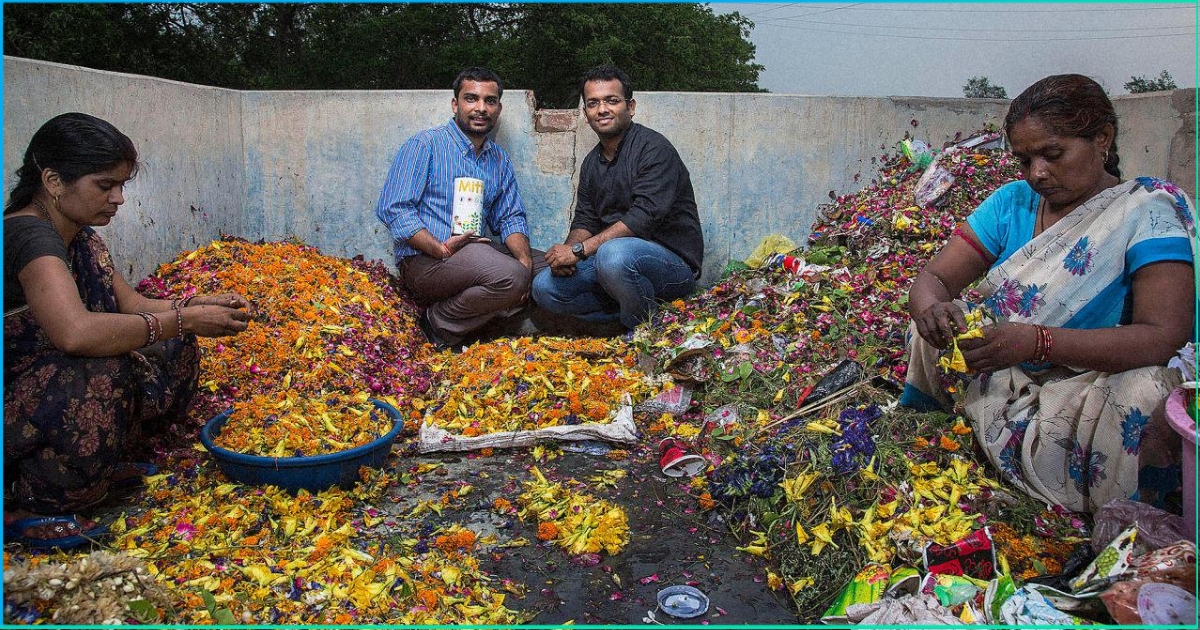Are you visiting a temple to offer your prayers? You must be carrying flowers, incense and other quintessential religious items with you. However, have you ever thought about the fate of the flowers, garlands and other items that land up in a heap in front of the deity? Ankit Agarwal from Kanpur was accustomed to seeing piles of flower petals among other waste being dumped every day into the Ganges, turning the river into a reeking streak of toxic water.
When Ankit quit his corporate job as a computer engineer, his parents were concerned that he is leaving a high-profile job to clean temples. Today, standing at the UN General Assembly as an inspirational changemaker, Ankit has made the entire nation proud.

Today, due to his sole efforts, the flower waste from temples in Kanpur, Kanauj and Unnao in UP are transformed into all-natural incense sticks, vermicompost and organic thermocol. His organisation “Help Us Green” employs local marginalised women to handicraft such innovative products. Just recently, Ankit Agarwal has received the prestigious United Nations Young Leaders Award.
The story behind Help Us Green
“I remember it was Makar Sankranti when one of my friends from the Czech Republic had come down to Kanpur for a trip. We were sitting on the Ghats, pretending to be unperturbed by the sorry state of the river, when my friend implored me to do something about it. I brushed him off saying this has been the norm in India always. But, when I saw a local temple unloading heaps of flower waste into the river, I was appalled,” Ankit shares with The Logical Indian.
Determined to look for a solution, Ankit registered the help of his childhood friend Karan Rastogi, who frequented temples regularly.
“At first we were hesitant to start working in this domain as religion is a very sensitive issue, and we were unsure if our initiative will be welcomed or scorned upon,” reveals Ankit.
Together, the two of them ensued a prolonged survey, during which they interacted with flower sellers, temple priests and devotees to understand the gravity of the situation. “We found out that around two tonnes of flower waste is generated in Kanpur temples, every single day. Sadly, there were no government policies, no laws or initiatives in this regards, as nobody has ever spared one thought about this problem,” Ankit shares.
After months of survey and research, in May 2015, Ankit started Help Us Green, along with Karan; and they have discovered innovative ways to recycle temple waste.
Flowers do work wonders
At Help Us Green, heaps of flowers offered as part of worship in temples are collected the following day. Women, who were once ostracised by the society for performing garbage collection work, are now valued workers at the Help Us Green factory. Their delicate skills help to sort the flower petals and turn them into completely natural aromatic incense sticks. “We have coined the term ‘flower-cycled’ to designate our first-of-its-kind products,” shares Ankit.
“Flower-cycled” incense sticks are not the only thing they have innovated. Help Us Green also prepares high growth-inciting vermicompost (a type of bio-manure) from rotten residues of flowers, leaves and stems. They have successfully upgraded their vermicompost into premium quality manure by adding coffee residues collected from local coffee shops, coconut husks and other natural waste.

Incubated by funding from IIT, IIM and other premier institutions, Help Us Green has recently launched their R&D wing, where expert researchers have invented ‘Florafoam’ – the first organic thermocol in the world. The product awaits some final steps of finetuning to be commercially marketed soon.

Sow a packet, grow a plant
Every morning, when truckloads of flower waste reach the Help Us Green workshop, it contains plastic packets which cost the workers extra effort to segregate out. To ensure that such a problem is eliminated from their end, the organisation has infused their incense stick paper packs with Tulsi (Basil) seeds, which when empty can be simply sowed into the soil and watered into a vibrant, sweet-smelling Tulsi (basil) plant. “Our effort to make religion sustainable was hugely welcomed by everyone,” a proud Ankit declares.
Trivial lives have blossomed into meaningful existence
Ranjana used to work at a hospital to support her children’s education, assigned to do the ‘dirty’ tasks of cleaning the blood, pus or bodily discharge of the patients. She was often mistreated as ‘untouchable’, and her neighbours used to avoid interacting with her children. Her employment at Help Us Green has helped turn the tables as she feels that today she is doing a pure work. For her, the difference became apparent when priests and upper caste people started dropping in for tea at her house.

The story is equally heartwarming for about 78 other women working at Help Us Green. Most of them used to work as sanitation workers and faced vehement discrimination.
“We not only provide these women with fair wages, health and retirement benefits, we have also arranged a daily bus service for them for a smoother commute. We plan to engage around 5000 marginal women by 2022,’’ shares Ankit.
He narrates a memory he cherishes about one worker, who distributed sweets to everybody after buying a refrigerator from her salary. It was her lifetime’s wish to drink cold water at home.
The journey so far
“We started with 12 kgs of flower waste per day, now we are upcycling over 4.4 tonnes of flowers daily,” informs Ankit proudly. The data itself is evidence of their overwhelming success. Soon, the duo plans to collaborate with temples from Mathura and Varanasi, where 12 tonnes and 21 tonnes of temple waste are generated per day, respectively.
From financial constraints to gradually developing a whole new industry, challenges were aplenty for Ankit and Karan. The duo persevered and their efforts have been recognised by the Bill and Melinda Gates Foundation along with Forbes India. Now duly awarded by the United Nations, they wish to continue bringing a positive change to society.
The Logical Indian applauds the wonderful efforts of Help Us Green and wishes more people follow their example.
Also Read: This Man’s Initiative Has Cleaned Up 4,00,000 Kg Of Waste From The Himalayas In Four Years
With #MySocialResponsibility, we aim to bring you more inspiring stories of individuals and organisations across the globe. If you also know about any changemakers, share their story at [email protected] and we’ll spread the word.












